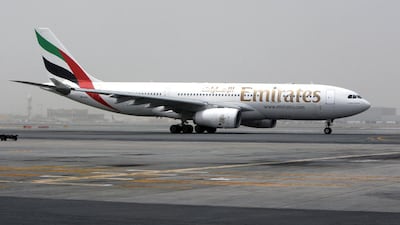Emirates airline will retire 26 older aircraft next year, as the world’s largest international carrier focuses on the fuel efficiency and modernity of its fleet to win more customers.
The airline said that it would further retire 13 aircraft in 2017 and 13 in 2018, making its average age of aircraft retirement at 15.7 years. The industry’s average is 25 years.
“Emirates is removing some of the older Airbus A330 and A340 jets, both of which are very fuel-inefficient,” said Saj Ahmad, chief analyst at StrategicAero Research. “The airline is removing not just old jets. It reduces costs by not having to support an ageing fleet and can redeploy pilots and crew on newer jets in its fleet.”
Fuel is the largest component of an airline’s cost. For Emirates, fuel accounted for about 28 per cent of its operating cost, according to its latest financial results, reported last month.
The planes being retired in 2016 are 12 A330-300s, four A340-300s, one A340-500, six Boeing 777-200ERs, two Boeing 777-300s and one Boeing 777-300ER.
At the same time, Emirates will add 36 new planes to its fleet in 2016. These planes include 20 Airbus A380s, the world’s largest passenger aircraft, and 16 Boeing 777-300ERs.
These two plane models are among the most fuel-efficient on the market, according to Emirates, emitting about 12 per cent less carbon dioxide than the retired planes.
Once Emirates retires the 26 aircraft and takes on new deliveries next year, its average fleet age will be 5.6 years, compared with 13.6 years for the average age at the top five airlines in North America and 10.7 years for the average fleet age at the top five airlines in Europe.
Tim Clark, the Emirates president, said the airline is committed to flying a modern fleet that is better for the environment and provides passengers with “comfort and safety”.
Emirates currently has 244 aircraft. The carrier received 26 new aircraft this year: 15 Airbus 380s, 10 Boeing 777-300ERs and one Boeing 777 Freighter.
Emirates has 262 planes on order valued at US$120 billion at list prices. Emirates’ order includes: 71 Airbus A380s, 42 Boeing 777-300ERs, 115 Boeing 777-9Xs and 35 Boeing 777-8Xs.
Emirates said that once deliveries for its new Boeing 777X come in early 2020, they will be 20 per cent more fuel-efficient than previous models. The aircraft are to feature larger windows, increased cabin pressure, higher ceilings, and a wider cabin than previous models.
selgazzar@thenational.ae
Follow The National's Business section on Twitter

